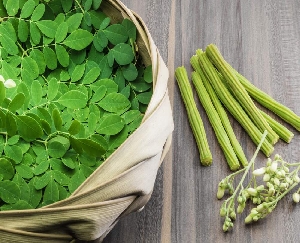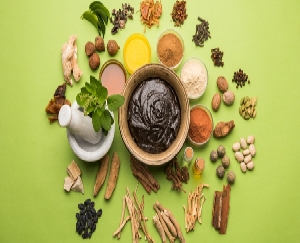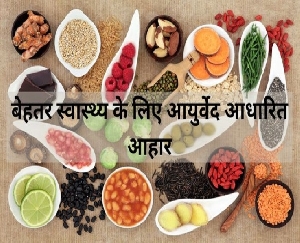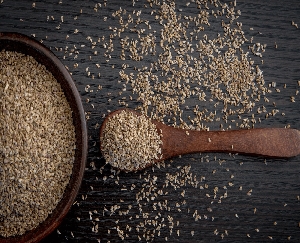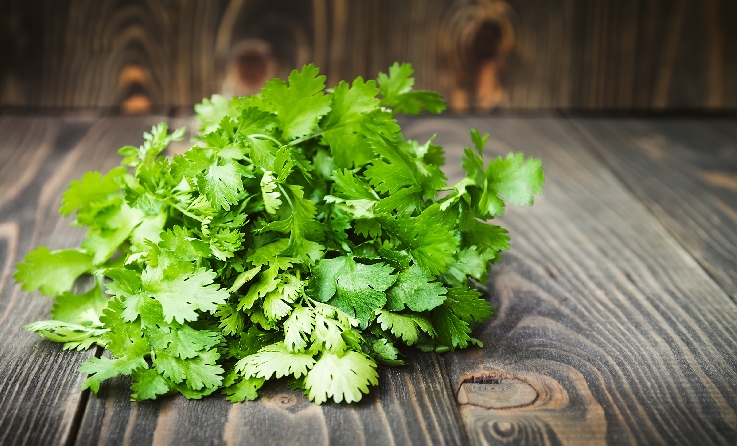
Coriander, also known as cilantro or Chinese parsley, is a herb that is widely used in culinary applications all over the world. It is a member of the parsley family and is believed to have originated in the Mediterranean region.
Coriander As Culinary
The coriander plant produces both leaves and seeds that are used in cooking. The leaves are often used as a garnish or added to dishes as a flavouring agent, while the seeds are commonly used as a spice. Coriander has a citrusy, slightly sweet and earthy flavour profile, which pairs well with many different types of cuisines.When using coriander in cooking, it is important to note that the leaves and seeds have different flavour profiles and uses. The leaves are best used fresh and added towards the end of cooking to preserve their delicate flavour. The seeds, on the other hand, can be toasted or ground and added to dishes at the beginning of cooking to infuse their flavour throughout the dish.
Coriander is a versatile herb that can be used in a variety of dishes, from soups and stews to marinades and dressings. Its unique flavour profile adds a bright and refreshing note to any dish it is used in, making it a staple in many kitchens around the world.
Read: Ash Tree Types, Facts, Care, and Diseases
Coriander As Medical Herb
Coriander has long been used in traditional medicine in addition to its culinary use. It is believed to have anti-inflammatory and antioxidant properties, and may also help to regulate blood sugar levels and improve digestion. Its unique flavor and aroma make it a staple ingredient in many cuisines, but its medicinal properties are equally impressive.
Rich in Nutrients
Coriander is packed with essential nutrients such as vitamins A, C, and K, and minerals like calcium, potassium, and iron. These nutrients are important for maintaining healthy bones, supporting the immune system, and improving overall health.
Digestive Health
Coriander has long been used as a digestive aid, as it helps stimulate the production of digestive enzymes and can soothe digestive discomfort. It can also help prevent flatulence, constipation, and diarrhea.
Anti-Inflammatory
The anti-inflammatory properties of coriander make it an effective remedy for inflammation-related conditions such as arthritis, asthma, and skin irritation. Coriander can also reduce swelling and pain.
Blood Sugar Regulation
Coriander can help regulate blood sugar levels by stimulating the production of insulin. This makes it a useful natural remedy for people with diabetes.
Cholesterol Reduction
Coriander can help reduce LDL or “bad” cholesterol levels in the blood.
Immune System Boost
Coriander has immune-boosting properties that can help prevent colds, flu, and other infections. It can also help reduce the severity of symptoms of these illnesses.
Anxiety Relief
Coriander has a calming effect on the nervous system, making it useful in treating anxiety and other stress-related disorders.
Skin Health
Coriander has antiseptic properties that can help prevent and treat skin infections, as well as heal wounds and cuts. Also, it might aid in lessening the visibility of scars and imperfections.
Coriander can be consumed in a variety of ways to reap its medicinal benefits. It can be added to food as a spice, brewed into a tea, or taken in capsule or tincture form. Coriander oil can also be applied topically to the skin.
It’s important to note that while coriander is generally considered safe, some people may have allergic reactions to it. Additionally, people who are taking medications or have certain health conditions should consult with a healthcare professional before using coriander as a medicinal herb.
Also Read: Goldfish Plant – Care, Propagation, and Varieties
Coriander in Different Countries:
Coriander is native to the Mediterranean region and Asia, but is now widely grown and used in various countries around the world. In this article, we will explore how coriander is used in different countries and its cultural significance.
India
Coriander is an essential ingredient in Indian cuisine. It is used in almost every dish, from curries to chutneys, and gives a distinctive aroma and flavour to the food. The seeds of the coriander plant are also used as a spice in many Indian dishes. Coriander is also known for its medicinal properties and is used in Ayurvedic medicine to treat digestive issues.
Middle East
Coriander is used extensively in Middle Eastern cuisine, particularly in countries such as Iran, Iraq, and Lebanon. It is used in soups, stews, and rice dishes, as well as in marinades for grilled meat. Coriander is also used to flavour a popular Middle Eastern drink called Jallab, which is made from dates, grape molasses, and rose water.
China
In China, coriander is known as xiāng cài and is used in a variety of dishes, including dumplings, stir-fries, and soups. It is also used as a garnish for noodle dishes and to add flavour to steamed fish. In traditional Chinese medicine, coriander is used to treat digestive problems and to stimulate appetite.
Conclusion:
Coriander is a versatile and potent natural remedy that has been used for centuries to treat a variety of health problems. Whether consumed as a spice or taken in supplement form, coriander is a safe and effective way to promote optimal health and wellness. It is also used for its medicinal properties in many cultures. Whether you call it coriander, cilantro, or pak chi, this herb has a significant cultural and culinary importance in many countries.
Know More about This :Moringa Nutritional and Medicinal Benefits

Dr. Naveen Chauhan
BAMS, PGCRAV (Ay. Surgery)Founder Director, Shri Dhanwantari Clinic, Ghaziabad











